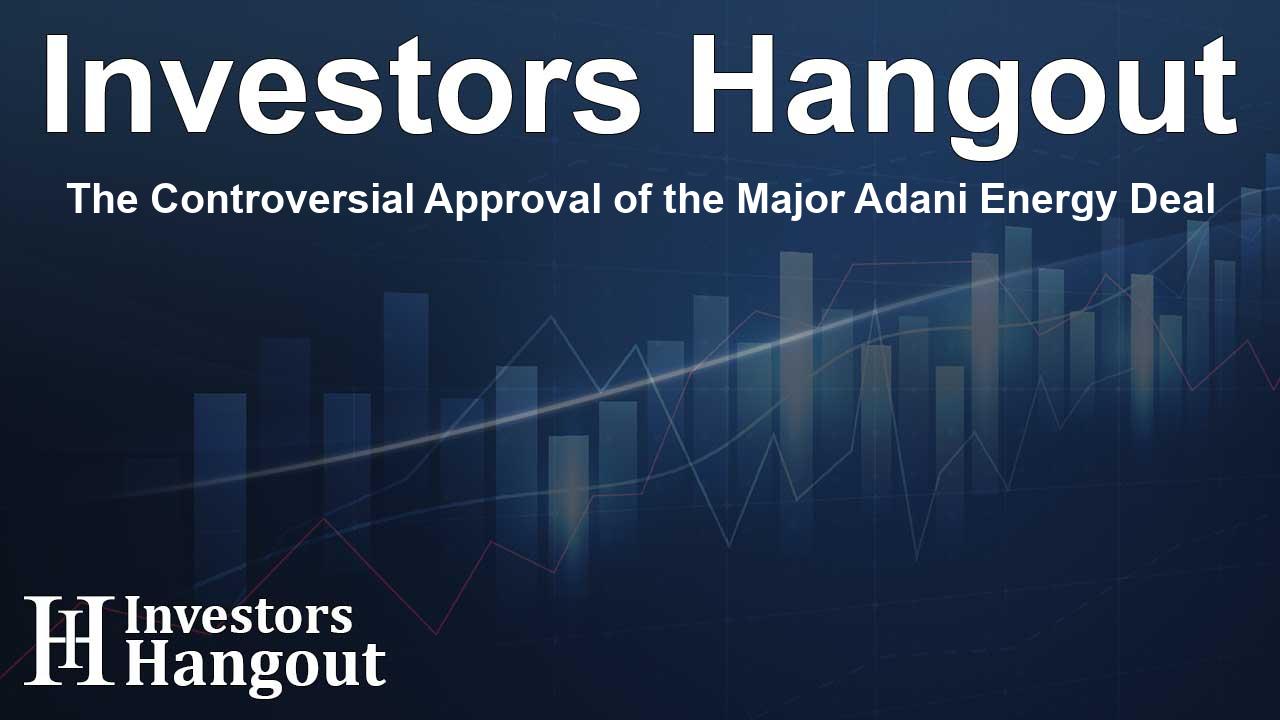The Controversial Approval of the Major Adani Energy Deal

A Controversial Deal in the Energy Sector
In a remarkable turn of events in the energy landscape, the Solar Energy Corporation of India (SECI) initiated an unexpected proposal on September 15, 2021. This federal agency, which plays a critical role in developing India’s solar energy sector, approached the southeastern state with an offer that would lead to signing the country's largest renewable energy contract.
Background of the Agreement
This enticing proposal was quite surprising, especially considering that only two years prior, Andhra Pradesh's energy regulators had assessed no immediate need for solar energy, advocating instead for a focus on renewable sources that could deliver consistent power throughout the day.
However, just a day after SECI’s unexpected outreach, the state cabinet, led by Chief Minister YS Jagan Mohan Reddy, quickly granted preliminary approval for the deal, as documented in official records.
The Role of Adani Group
While SECI's initial correspondence did not specify an energy provider, it was widely known that the agency had active contracts exclusively with two suppliers. Notably, the larger supplier was associated with billionaire Gautam Adani. By November, approval from the energy regulator paved the way, and on December 1, an official procurement agreement was executed with SECI, with projections indicating a potential annual worth exceeding $490 million.
Financial Implications
Analysis revealed that a staggering 97% of this financial inflow was likely earmarked for Adani Green, the renewable division of the Adani conglomerate. Yet, the timeline was striking; within just 57 days from SECI's inquiry to regulatory endorsement, this colossal deal was approved—a duration that legal experts noted as unusually swift.
Scrutiny and Allegations
The rapid approval process has come under legal scrutiny, with U.S. prosecutors indicting Adani and several associates due to allegations of their involvement in a significant bribery and securities fraud scheme. The allegations asserted an offer of $228 million to an unnamed Andhra Pradesh official intended to persuade state electricity distributors to procure energy from Adani Green. This development raises serious questions regarding the integrity of the approval process.
Governance and Oversight Challenges
A deeper examination of state government documents and interviews with various officials paints a troubling picture. Reports indicate that political leaders might have dismissed crucial insights and warnings from finance and energy experts, resulting in a deal that could impose a substantial financial burden on state resources and taxpayers. Many officials cautioned that the agreed terms appeared to conflict with the state's energy needs, suggesting that citizens could face high costs for an unneeded energy supply.
Response from Stakeholders
Despite the emerging scandal, Adani Green declined to comment on the allegations surrounding corruption or any specifics concerning the approval's quick pace. The Adani Group has labeled these allegations as unfounded and continues to defend the legitimacy of the contract.
In response, SECI emphasized that the responsibility for power procurement rests with the states and their respective regulators. The office of Chief Minister Reddy, who recently lost election power, provided some defense, stating the deal aimed to generate free electricity for farmers and denying accusations of misconduct.
Looking Ahead
In the fallout of these developments, Andhra Pradesh is contemplating the suspension of the deal, particularly in light of Adani's indictment. A verdict on this matter is expected soon, potentially influencing the state’s financial obligations significantly.
Conclusion: The Future of Energy in Andhra Pradesh
If the deal proceeds, Andhra Pradesh stands to commit billions in solar energy payments that could rival state budgets for essential social programs. This case exemplifies the complexities and political tensions surrounding energy procurement in India today, highlighting the delicate balance between ensuring energy security and managing fiscal responsibility.
Frequently Asked Questions
What led to the approval of the Adani deal?
The approval of the Adani deal happened quickly after an unexpected proposal from SECI, despite prior assessments indicating no immediate need for solar energy in the state.
How much does the Adani deal potentially cost?
The deal could cost Andhra Pradesh over $490 million annually, with a significant portion going to Adani Green.
Are there allegations of bribery around the contract?
Yes, U.S. prosecutors have indicted Adani and others on charges related to bribery aimed at influencing energy purchasing decisions in the state.
What has been the response from the involved parties?
Adani Group has denied all allegations of wrongdoing, while state officials have defended the deal's validity.
What impact does the deal have on state finances?
If finalized, the deal might impose heavy financial obligations, significantly affecting the state's budgets and public service funding.
About Investors Hangout
Investors Hangout is a leading online stock forum for financial discussion and learning, offering a wide range of free tools and resources. It draws in traders of all levels, who exchange market knowledge, investigate trading tactics, and keep an eye on industry developments in real time. Featuring financial articles, stock message boards, quotes, charts, company profiles, and live news updates. Through cooperative learning and a wealth of informational resources, it helps users from novices creating their first portfolios to experts honing their techniques. Join Investors Hangout today: https://investorshangout.com/
Disclaimer: The content of this article is solely for general informational purposes only; it does not represent legal, financial, or investment advice. Investors Hangout does not offer financial advice; the author is not a licensed financial advisor. Consult a qualified advisor before making any financial or investment decisions based on this article. The author's interpretation of publicly available data shapes the opinions presented here; as a result, they should not be taken as advice to purchase, sell, or hold any securities mentioned or any other investments. The author does not guarantee the accuracy, completeness, or timeliness of any material, providing it "as is." Information and market conditions may change; past performance is not indicative of future outcomes. If any of the material offered here is inaccurate, please contact us for corrections.